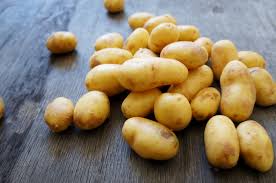(单词翻译:单击)
听力文本
Now, the VOA Learning English program Words and Their Stories.
Food expressions are popular with language learners. They combine two things important to every culture: food and language.
Today we are going to talk about spuds, a nickname for potatoes!
First of all, potatoes have been around for a very long time. In the food magazine Bon Appetit, Sam Dean writes about the beginnings of the potato. He explains that the common white potato came from Peru at least 7,000 years ago. Potatoes fed the Incan empire and other cultures in Peru at that time.
These days, most countries use a type of potato in their cooking.
Whether you like them boiled, baked, mashed or fried – potatoes are what we call a staple. This means they are a basic food that you can build on. You can cover them in gravy, butter, salt and pepper or sour cream and herbs.

And for people who eat pork, you have not lived until you have eaten a baked potato topped with melted cheese and crispy bacon. Mm-mm. Yum!
Speaking of meat on top of potatoes, let's go back to the idea of potatoes being a simple, basic food.
We have a potato expression to describe a person like that: simple, basic, common. If someone is a meat-and-potatoes kind of person, they prefer eating simple meals such as – well, meat and potatoes. They are not interested in complex, fancy food. They are unpretentious.
Men are often described by this expression. When I hear about a meat-and-potatoes man, I picture a big, beefy guy. He likes to wear blue jeans and a simple t-shirt. He probably drives a truck and can fix it himself. He is a simple, no-nonsense kind of guy.
I like my steak well done, my taters (potatoes) fried
Football games on Monday night
It's just who I am
A meat and potato man
It is a little less common, but we can also describe a woman as a meat-and-potatoes kind of person. This type of woman not only likes to eat steak and hamburgers, she is also a down-to-earth person. She likes simple things, can take care of herself and is comfortable just hanging out with the guys.
Besides describing people, there is another way we use meat-and-potatoes. It can also describe the most important part of an activity or event.
For example, you might say that order is the meat-and-potatoes of teaching children. The teacher cannot teach and the children cannot learn in a loud, wild, messy classroom. Now, order may not be the most exciting part of teaching little ones, but it is arguably the most important -- or, the meat-and-potatoes.
In another example, you could say that voter outreach is the meat-and-potatoes of any political campaign. If people don't come out to vote for your candidate or issue, the rest of your campaign strategy really does not matter.
Okay, as you know, potatoes hold heat well, meaning they stay hot for a long time. This idea led to the "hot potato" party game.
Here's how you play. Players form a circle and toss a small object quickly to each other while music plays. You want to release the object as fast as possible, as if it was a hot potato. When the music stops, the player holding the potato must leave the game.
However, "hot potato" is more than a game. It can also mean a divisive or difficult issue. So, you could say the lawmakers discussed a few hot potato issues at the meeting.
And if an issue is too controversial, it might be a good idea to "drop it like a hot potato." When you drop something or someone like a hot potato, you leave the person or thing completely and quickly.
Take my friend Olga, for example. She was dating this guy for a few months and she really liked him. But when she saw him acting unkind to a little puppy, she dropped him like a hot potato! You see, Olga loves animals, especially dogs.
Hot potatoes might be important issues but "small potatoes" are just the opposite. They are unimportant matters. We often use the term small potatoes when we dismiss something. It is simply not worth our time.
Again, my friend Olga can help explain. After a storm damaged her hometown, she decided to collect money for homeless animals. She had little time to do so. There were so many cats and dogs without any food or shelter.
To help, I suggested selling lemonade to raise some money.
"Small potatoes!" she cried. "We need to go for big business donors. They have real money to spend!"
People can also be called "small potatoes." It is a way of saying they are not a threat. If police in a big city do not have enough resources, they probably won't waste manpower on small potatoes, like bicycle thieves. They have bigger fish to fry.
But please note. We may say "small potatoes" for trivial, unimportant matters.
But, we do not say "big potatoes" for important ones. English is funny that way!
And that's Words and Their Stories.
I'm Bryan Lynn.
And I'm Anna Matteo.
重点解析
1.have been around 见过世面;经验丰富;老于世故
Jeans, the all-purpose denim trousers, have been around for over a hundred years.
牛仔裤,这种适合各种用途的斜纹粗棉布裤子,已经有一百多年历史了。
2.down-to-earth 现实的;务实的;切合实际的
I like your down-to-earth and hardworking spirit.
我就喜欢你们这股扎扎实实埋头苦干的劲儿。
3.bigger fish to fry 有更重要的事要办;有更重要的事情要办
Sorry I can't afford to sit here and chat with you all day. I have bigger fish to fry.
很抱歉,我不能整天坐在这儿和你瞎侃。我还有更要紧的事要做。
参考译文
现在是VOA学英语《词汇掌故》的节目时间。
食物相关的表达很受语言学习者的欢迎。这些表达结合了两种对每种文化都很重要的东西:食物和语言。
今天,我们要聊聊“spuds(土豆)”,它是马铃薯的一个昵称。
首先,土豆存在的历史已经很悠久了。在美食杂志《好胃口》中,山姆·迪安描述了土豆的起源。他解释道:常见的白土豆出自至少七千年前的秘鲁。土豆供养了印加帝国以及秘鲁当时的其他文化。
如今,大多数国家在他们的烹饪文化中都会用到一种类型的土豆。
不管你是喜欢煮的、烤的、捣碎的还是油炸的,土豆是我们所谓的主食。这意味着它们是一种基础食物,你可以在此基础上发挥。你可以用肉汁、黄油、盐和胡椒粉或者酸奶油和香草来覆盖它们。
对于那些吃猪肉的人,没吃过上面撒着融化的奶酪和脆培根的烤土豆,你都算白活了。嗯……。好吃!
说到土豆上面的肉,让我们回到土豆作为一种简单的、基础的食物的概念上来。
我们有一个形容“简单、朴实、普通”类型的人的和土豆相关的表达。如果某人是一个喜欢简朴(meat-and-potatoes)那类的人,他们更喜欢吃简单的餐食:好吧,肉和土豆。他们对复杂、精美的食物不感兴趣。他们是朴实无华的人。
这个表达经常用来形容人。当我听说一个喜欢简朴的人,我会想象这个人高大、壮实。他喜欢穿蓝色的牛仔裤和一件简单的T恤。他也许开着一辆卡车并且会修车。他是一个简单、直率的人。
我喜欢全熟的牛排,土豆条
星期一晚上的足球赛
我就是我
一个简朴的人
虽然这个表达用来形容女人不常见,但是我们也可以用它来形容一个女人简朴。这种类型的女人不仅喜欢吃牛排和汉堡,而且也很脚踏实地。她喜欢简单的事物,可以自己照顾自己,和男生们一块出去玩时也很自然。
除了用来形容人,“meat-and-potatoes”还有另外一种用法。它也可以用来形容一个活动或者一场比赛中最重要的部分。
例如,你也许会说秩序是教育孩子中最重要的事情。老师没办法在一个很吵闹、疯狂、混乱的教室中教学。然而,秩序也许不是教育孩子中最令人兴奋的环节,但是秩序无疑是最重要的,或者说是最主要的部分。
再一个例子,你可以说选民外展服务是任何政治竞选中最重要的环节。如果人们不出来投票给你的候选人或议题,你的其他竞选策略真的无关紧要。
好的,如你所知,土豆保温性好,意思是它们能很长时间内都是热乎的。这个理念产生了“热土豆(hot potato)”的派队游戏。
这是这个游戏的玩法。参与游戏的人围成一圈,在音乐播放时迅速地将一个小物体抛向彼此。你想尽快脱手这个物体,仿佛它是一个热土豆一样。当音乐停止的时候,手拿“土豆”的参与者就会被淘汰。
但,“hot potato”不仅仅是一个游戏。它也可以指一个引起纷争或者一个麻烦的问题。因此,你可以说立法者在会上讨论了几个棘手的问题。
如果一个问题太有争议性,也许“像扔烫手山芋那样扔掉它(drop it like a hot potato 马上放弃)”会是个好主意。当你马上放弃什么事情或者一个人,你彻底而快速地离开一个人或者摆脱一件事情。
例如,以我的朋友奥尔佳来说。她和一个男人约会了好几个月了,她真得很喜欢那个男人。但是当她看见他对一只小狗狗的不友善行为之后,她马上放弃了他!你知道,奥尔佳喜爱动物,尤其是狗狗。
“hot potatoes(棘手的问题)”可能是一个重要的问题,但是“small potatoes(小人物/微不足道)”则与之相反,它指的是不重要的事物。我们往往在摒弃什么的时候会用到这个表达,不值得浪费时间在那方面。
再一次,我的朋友奥尔佳可以帮忙解释。在一场暴风雨摧毁了她的家乡之后,她决定为那些无家可归的动物募捐。但她几乎没时间做这件事情,因为有太多的猫和狗没有食物和容身之所。
为了帮助她,我给她建议通过销售柠檬水来筹集资金。
“杯水车薪!”她喊道。“我们需要去找大企业捐助者。他们才真正有钱!”
“small potatoes(小人物)”也可以用来称呼人。这是一种表达一个人没啥威胁的方式。如果一个大城市的警察没有足够的警力,他们也许不会在小人物身上花太多人力,比如一个偷车贼。他们有更重要的事情要办。
但请注意。我们也许会将琐碎的、不重要的事称之为“small potatoes”。
但是我们不会将重要的事情称之为“big potatoes”。英语的这点很有趣!
这就是本期的《词汇掌故》。
我是布莱恩·林恩。
我是安娜·马特奥。


